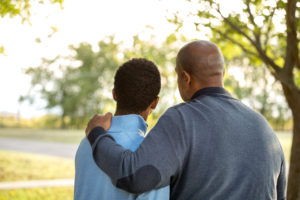
Author’s-website-&-logo
Teflon Coated
Can you remember being offended when someone commented on you when you were a kid? Maybe it was in the company of adults, and your parents made a statement about a trait you had. “Oh, he’s just that way,” or “he won’t do that; he doesn’t like that.” What did that do to your self-confidence? How did it make you feel? If you heard the comment as a child, you might have thought—”I don’t feel that way,” or “that’s not me,” but adults are saying it about you, so you either accept it or react to it.
Kids are insulted, disrespected, offended, hurt, snubbed, and slighted many times during a typical day at school. It may even surprise you if you could observe them say during a passing period at school. I would venture that kids today receive many more insults than even you and I did that their age. It is essential to help kids receive insults from others diplomatically and move on. Stephen R. Covey, in his landmark book, The Seven Habits of Highly Effective People, reminds us that between a stimulus and our response is a space, and in that space, we have a choice as to how we respond.
Stimulus Freedom to Choose Response

African American father and son are talking.
When you have small children, they experience a negative stimulus, like someone hitting them—even playfully, they immediately respond, either with a hit back or by crying. But as we grow older, we realize that in-between the stimulus and response is the Freedom to Choose. We always choose how we respond, but we must teach our kids this concept.
Take some time this holiday and sit with your child, grandchild, or another that you’re close to and help them understand that they have the freedom to choose their reactions, even in the most extreme cases. This concept will help them become Teflon-coated and add to their resiliency in life.
I discuss this in my book, Making Sense of Life: A Guidebook for Teens and Parents. It is available now as a paperback, eBook, and soon multiple audio formats.
There is nothing better for a child than coming home to a Warm, Caring Environment; read this post here, A Warm, Caring Environment – Dr. Rich Patterson (pattersonphd.com)
Environments make a huge difference for kids. Psychology Today has a great post; click here to read it; Orderly and Disorderly Environments and Creativity | Psychology Today
Yours for a better life—Rich
Let’s Connect!